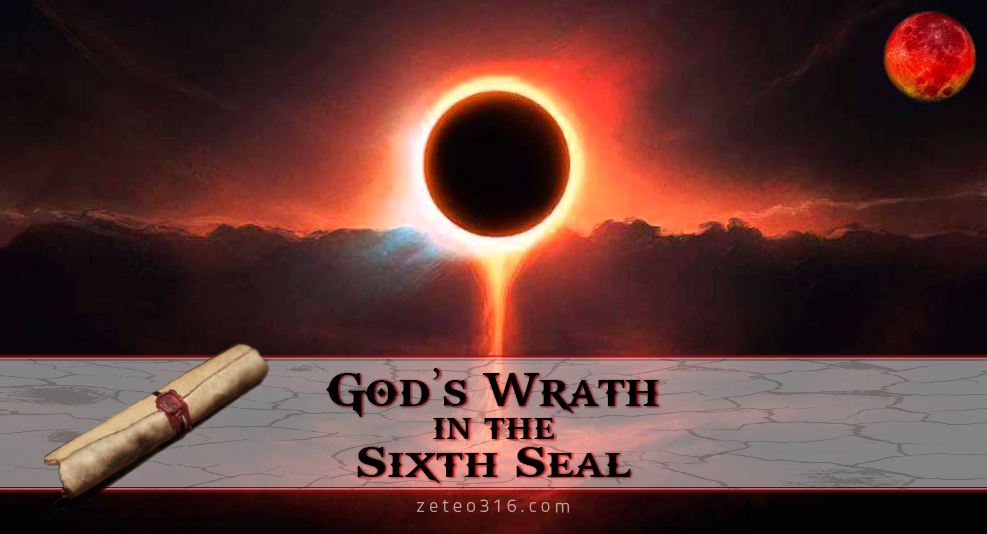God’s Wrath in the Sixth Seal? Proponents of the prewrath rapture system teach that God’s wrath is still future at that time.
“For the great day of His wrath has come, and who is able to stand?” Rev 6:17
These words are spoken by unbelievers as a reaction to the cosmic signs and the great earthquake. Pretribulationalists hold that the verse indicates present and past wrath. Many non-pretribulationists consider this a portent of what is to come and that God’s wrath is still future.
In his book The Pre-Wrath Rapture of the Church, Marvin Rosenthal cites posttribulationist Robert Gundry:
The verb wrath in Revelation 6:17 can be an ingressive aorist expressing a condition ‘just entered’ or a dramatic aorist which functions like a future tense – that the wrath is about to begin. ~ (p 165)
Rosenthal cites Mark 14:41 and Rev 19:7 as examples of this aorist tense which is future. He asserts that “there isn’t any exegetical basis for making the sixth seal retroactive.” He claims to have consulted over 40 commentaries without finding anyone suggesting that Rev 6:17 looked back and encompassed the previous seals. Rosenthal thought this was a “glaring problem” for pretribulationism (p 167).
Similarly, Robert Van Kampen (The Rapture Question Answered) argued that the phrase “has come” in Rev 6:17 refers to a future action. He called it an “ingressive use of the aorist” in the context of the passage. He wrote:
Because the word wrath is not mentioned in the book of Revelation prior to the sixth seal, and because the signs given in the sun, moon, and stars referred to in the sixth seal parallel the signs that will occur announcing the day of the Lord’s wrath (Joel 2:31; cf. Matt. 24:29-31, 37-39), the context of our present text seems self evident. It is an event that is on the threshold of happening – a future event soon to occur. ~ (pp 153-154)
In contrast, pretribulationist Thomas Ross wrote:
…that God’s wrath “is come” in Rev 6:17 is an aorist indicative indicates that past time is the strong basic predisposition…the fundamental tendency for interpretation is to assume that the wrath began at some time before that point; that the aorist can occasionally have a futuristic sense does not justify the assumption that it does so here.
In response to Ross, Eschatos Ministries (Alan Kurschner) observed:
Greek linguists today are now rejecting that mistaken view of the aorist. You have to prove temporal reference from the context, not from appealing to the Greek tense-form.
You can find the article at the Eschatos Ministry website ( note that Kurschner teaches biblical Greek). You can also read Alford’s brief comments on line. He says: “the virtually perfect sense of the aor. ἦλθεν here can hardly be questioned.” In Revelation 1-7 An Exegetical Commentary, pretrib scholar Robert L. Thomas writes that “has come” is aorist indicative” and refers to a previous arrival of wrath. He provides his grammatical reasons for this and responds to Rosenthal’s use of Mark 14:41 and Rev 19:7 (pp 457-460).
Are you as confused as I am? If you don’t know Greek grammar then who do you believe? Keep in mind that what keeps coming up in these aorist debates is context.
Recall how Van Kampen said that the word rapture wasn’t mentioned before the 6th seal? Neither is the rapture mentioned anywhere in Revelation, yet he assumes it occurs between the 6th and 7th seals. What he takes as “context” regarding God’s wrath is an assumption of the correctness of his system.
On the other hand pretribulationists note that the seals are opened by Christ. The language used in the 4th seal parallels the wrath, judgment and anger used in Ezekiel 14:21; 5:15-17 and 7:3-19. We also note that Rev 6:17 is uttered by unbelievers. How do they know God’s wrath is still future if it isn’t already present? This would seem to contradict 1 Thess 5:2-3.
Finally, Scripture is definite on this. A comparison of Isaiah 2:10-21, 13:9-13 and Rev 6:12-17 confirms that that the 6th seal is, indeed, a part the Day of the Lord’s wrath.
For further information read Tony Garland’s commentary HERE

